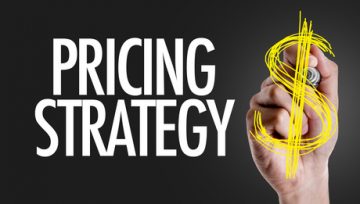Should You Raise Your Prices?
When I first met my wife Karen she had a job at a local butcher shop in Vancouver, BC. The owner’s name was Fred. He was a master at pricing.
He always positioned himself at the main cutting table with the butchers to his left and the meat display counter to his right. Fred was right there should anything need his attention; he could also keep his eyes and ears on everything. He regularly heard his customers talking about his prices and they didn’t know it.
“Magic Prices”
Like most good philosophies his concept on pricing was simple. “Everything has a magic price” he used to say. You should adjust until you hit the sweet spot. That’s where you sell just the right amount of everything to maximize your revenues.
When you think about it his pricing challenge was actually quite difficult. If the chicken breasts were priced too low – they would really move – and then he would wind up having to drop his prices on thighs, legs, and wings so they would move at the same rate. Should they not sell fast enough he might have to dispose of them.
Fred also had more than chickens to consider. He had sides of beef and pork products to price. It was, and still is, a busy butcher shop. Raising and lowering prices was a continuous activity for him.
His pricing also considered the twelve employees who worked for his company. Fred wanted to pay them well enough so they could comfortably support their families and enjoy life. His company had also just purchased a brand new retail store and the pricing had to be able to make enough money to cover the cost of that. A lot depended on Fred’s “magic pricing” strategy.
Pricing is one of the most critical issues for company owners. It is the key to a successful business model. Owners need to regularly ask themselves: should I raise the prices? Sometimes they resist increasing prices because they believe that customers are hard to come by and they worry about losing the ones they already have.
The problem with setting prices too low is that it becomes very challenging to operate a company when you’re constantly leaving money on the table. You could be slowly squeezing the life out of your company.
How will increasing your rates impact the ‘busy-ness’ of the business? If you introduce a ten percent increase and ten percent of the clients leave then you’ll earn approximately the same revenues for less work. That’s not too bad. Chances are the customers who disappear aren’t the ones that you liked serving anyways. On the other hand, you can’t move them too high because even your good customers will stop buying at some point. Like Fred, you need to be looking for your “magic price.”
Grinders Don’t Care About Your Company
Grinders are one of the reasons that small business-people are reluctant to increase their prices. These people seem to make it their life’s mission to put small company owners out of business. They always say everything costs too much and they make the same complaint everywhere they go. Grinders are often loud and annoying and that doesn’t end when they make the purchase. After-sales service can be very challenging. There appears to be way more grinders than there actually are. To try and save a buck they’ll contact a lot more companies than the average consumer does, this causes the illusion. They’ll even burn ten dollars worth of gas to save five bucks, but that’s a different story.
Every small business gets more than their share of them. They don’t really bother big companies though. I’d like to see one of them go into Starbucks and offer to buy their coffee if they match McDonald’s price. How about going into the Ritz-Carlton and asking for the Super 8 rate? I’m sure that will go over well.
Fred was a rare individual. He was friendly and grumpy at the same time. He didn’t have a lot of respect for grinders. He understood that the success of his company relied on his pricing. I can’t even guess how many times in his forty-year career as a butcher he asked himself: should I raise my prices?
Entertaining the Question: Should I Raise my Prices?
When you set your pricing you need to consider the ongoing health of your business model. Are you going to be able to pay your key staff well enough to retain them? Will your company be able to earn enough profits to invest in future growth? Are you yourself going to be paid well?
If you think that dropping your prices will increase sales and hopefully profits as well then you should be careful because the lowest price strategy depends on having the lowest costs. Big box stores are infamous for beating down their suppliers. If you adopt this approach you most likely will have to become a grinder yourself.
If you plan to compete on price, but you don’t have the lowest costs you are setting yourself up for a hard and difficult journey in business and it probably won’t end well. Constantly asking yourself how can I lower my prices instead of should I raise my prices is a strategy that bankrupts a lot more business-people than it rewards.
It’s possible to be even-handed in your pricing strategy. Some items on your ‘menu’ could be raised while others are lowered. If you have a large ‘menu’ it’s highly likely that some adjustments should be made somewhere.
It’s also a good idea to secret shop your competitors to find out where their pricing is at. If you discover there’s a range of strategies then take the time to look around and see which companies are more successful. Are they the ones with the lowest prices or the highest?
It’s often a hard lesson to learn, but money is not the only factor in most purchasing decisions. Initially when you start asking yourself the question: should I raise my prices it will take you out of your comfort zone. It’s also likely to give you a healthy fear. It may challenge you to improve your company’s service or increase the quality of your products. Alternatively, it may prompt you to adjust your marketing so you get a better shot at the higher-end business. These are all good things.
Moving Forward
If you increase your prices it can make all the difference in the world. I know a company owner who increased his prices by ten percent and his business went up by twenty percent. Only half of the gain can be explained by the price increase. The other half was caused by a combination of other factors. He believed that they had to justify the increase so he improved the way they explained their value to their customers.
Also, some of his prospects previously took their business somewhere else because they thought his quotes might be too low for him to complete the work properly.
It’s a good idea to schedule regular reviews of your pricing strategy. Follow Fred’s lead by making “magic pricing” a regular activity. It can bring you great results. Experiment a bit, take a few acceptable risks at first, but entertain, I mean really entertain the question: should I raise my prices?
Fred brought in a partner and then retired. His partner, in turn, brought in some younger partners and the company continues to create great lifestyles for the owners and staff. The benefits of a good pricing strategy can last for generations.







Doris Woodman-McMillan
There is a challenge with raising prices for a company – that issue is the self-confidence of the owner! John is absolutely right when he comments on the perception by the public that your worth is somehow lacking when your prices are lower. Remember to give your best at all times, and stop selling yourself short.
Lilianne fuller fuller
This is a topic I will be looking very closely at in the new year. I’ve been told that my fees are very cheap for what the client receives in return, yet one client, when I quoted an hourly rate, asked “how fast could I write?” and another said that a ceiling of $200.00 was too high for a multiple topic newsletter. So I’m not sure what to do.
John Cameron
All companies should be designed to profitably deliver value. It’s important to focus on the value and less on the hours. I know it’s hard when you’re getting started, particularly when you are selling yourself. The challenge is finding a market that appreciates your value enough to pay fairly. Try asking your contacts and perhaps even successful writers in other geographical markets. It’s a journey of discovery.
Lilianne Fuller
Sorry for the late reply,I have found out that other perks could be more valuable at this time. For example, I may be getting my own column in the senior’s section. That is far more valuable than a raise at this time!
Gillian Polard
This year I learned a very valuable lesson: Do not give out discounts and do not lower your rates out of fear. If you do, in the eyes of your client your worth is also diminished. I am slowly raising my rates with new clients but its a struggle and every time I quote a price i have that moment of panic that no one will ever want to work with me! So far, its never stopped anyone 🙂
Crystal-Marie S
Thanks for the encouragement this post provides! I’ve definitely suffered Gillian Polard’s panic moments, and totally agree with Doris Woodman-McMillan. The ‘grinders’ will spend $800/month on coffee out of boredom. As with any relationship – honestly – do not entertain anyone who doesn’t respect your value; they can’t possibly be representative of your client profile.
Dawn Howard Weaver
Hi John,
The part that resonated the most was losing a customer due to an increase – and that customer being one that I didn’t really resonate with anyway. I have had this happen and it was a win for us both.
Thank you,
Dawn Howard Wever
John Cameron
It is surprising how often we let people who are not a good fit for us HOLD ALL OF OUR PRICING BELOW WHERE IT SHOULD BE. Sorry for the caps, but I believe it’s an epidemic problem in the small business world.
Mun B
Some very interesting points John, this is such an important topic in the industries where I have worked in Hospitality and Tourism, especially in Hotel and Golf sectors where price placement was everything and but at the same time price integrity and margins were also important. I wish I had a Magic Price platform back then!
Miriam
What great common-sense advice! It’s so important to believe in your products and your service, and price accordingly. It speaks volumes to current and prospective customers.
Lane Snider
Solid advice John. I like your new site by the way.
Debbie Marshall
Thanks for a good article. I find pricing to be one of the most challenging decisions I make. It’s not an exact science to be sure. However, being able to justify my services (to those that think they are too expensive), is critical. For small businesses I believe it comes down to your value proposition. What value do you bring that differentiates you from the competition. Once you know that answer, pricing gets just a little bit easier.
Thanks for the thought provoking piece.
Sarah Roe
Love this! Came along at the right time – given me the courage to do this and lose the grinders!!!!
Gary Mendoza
Very good article and a lesson I learned the hard way. I was setting my prices based on my expectation of what a customer would pay. When I spoke to other business owners at networking events they all said “your prices are too low”. I was surprised to hear this but paid attention. I literally doubled my prices and it made absolutely no difference in terms of attracting customers, it certainly didn’t put them off and it doubled my income. A bit scary when I first increased the rate but demonstrates the importance of an accurate pricing strategy.
Julie Musial
Great article, you’re right on. Sometimes you need to change your focus of who your target audience is. Many businesses focus on the grinders without realizing it. It’s better to focus on a demographic that sees the value in your product or service and has the means to pay for it.
Kochneva Maria
nice article!I do agree!a price creates a perception of your product as good or bad. the only thing is when the macro environment is bad, the economic indicators are poor, unemployment is there, people pay attention to the price only, a cheap one !!
Tom
Price is not everything, but it reflects your (product’s) VALUE in customers’ eye.
jogesh grover
lesson learned. irrespective of the price, the first comment is that it is too high. If work is needed to be done, price is not the highest determining factor.
John Cameron
You’re right small business-people hear “the price is too high” far more often than they realistically should. If they take the comments to heart and adjust downwards they slowly starve their companies of the resources they need to grow and develop.
Christopher Robins
Great article John….. far too often we undervalue our service or product in our pricing… if the value is there then the pricing should not matter…. you may not get all the customers you want but you will certainly get the right ones…. as for grinders they are everywhere…. I tell them K-Mart is on the next street over.
Loris Barbieri
Great article
Roxann Souci
I find that setting prices can be a challenge for consultants in many fields. I found your article insightful and will recommend it to my business groups. Very helpful with practical advise!